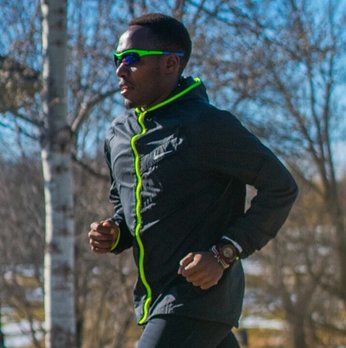 Benson Langat’s face is wide open when he looks at you. You have to lean forward to hear him talk, he speaks so softly, and he never breaks eye contact. As you ask him a question or answer one from him, he looks right at you, his mouth soft and smiling, and he never interrupts. It’s not what you think of when you imagine someone who is trying to be an elite runner, to knock another three minutes off his half-marathon time to flirt with 1:05 and get closer to a life he didn’t even imagine for himself until after he graduated from high school in Kenya. Langat, 29, grew up outside of Kapsabet, Kenya, on a small goat farm with his family. He was barefoot and played rugby and dreamed of one day coming to the United States, a country he imagined as all bright lights and big cities, a worldview given to him by commercials and television shows. Where he was from, though, there were few ways to get to college in the U.S., and one of them was running. That meant Langat had to transform from being a soccer and rugby player to being a runner, dropping more than 60 pounds along the way. He had a cousin who was running for a coach in New Mexico, and that inspired him. 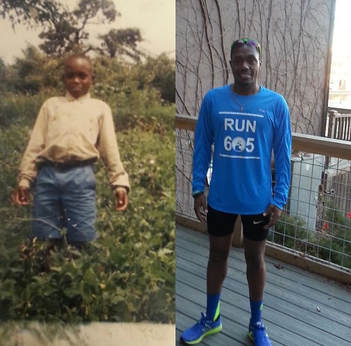 He began running in the mornings at 4 a.m., so nobody could see him. “People thought I was crazy when I started running,” Langat says. “Running in Kenya, you either go pro or not, there’s nothing in between. You train to go run overseas. It’s a job.” He kept it up for a few months, doing what many people do when they decide to become runners: Start, and stop. Try, get frustrated, give up, try again. It’s the story of every runner, from someone at the back of the pack to someone standing on the podium. “I was like do I want to do this, this is very painful,” Langat says. It was, but it was more than that: It was his chance. He met a professional runner who knew his cousin, and he ran with him, taking in the training and the encouragement, building a base and seeing a possible future a little more clearly. At the same time, he took foreign-language tests and the SAT and did well. He had the scores to get into school, and now he needed the times to get on the teams. The next step was to join a running camp, which he did. It’s just what you might imagine: A group of young men living together and running and eating and sleeping like clockwork as they train their bodies. He trained for nearly two years. “This is going to be an opportunity to me to get fast, to get on a plane and get to the U.S.,” Langat says of that time. “Everybody wants to come here, even to visit. I wanted that opportunity.” He got it. 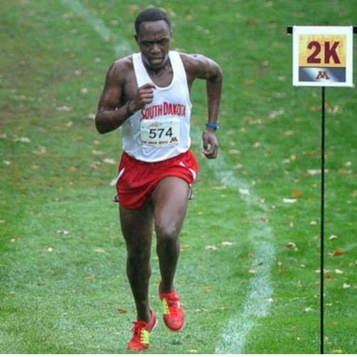 He landed in North Carolina to go to school at a junior college, and eventually he was recruited to come to the University of South Dakota. He started out as a miler and 800-meter runner, and he moved to the 5K and 10K when he went to USD. There was a little culture shock. “When I went to Kansas, I was surprised to see a lot of farms,” Langat says. “I thought it was all city lifestyle. I thought maybe America gets their food and everything from South America.” He was also surprised to see poverty in the United States. “You go to the reservation, and there is struggle, and you go to Chicago, and there is struggle,” Langat says. “That shocked me when I came here. For me, I thought everyone was well off, but you have to work.” He acknowledges that people have the same misperceptions about Kenya. He ran, got faster, went to USD and graduated with a double major in business administration and health science in 2014. 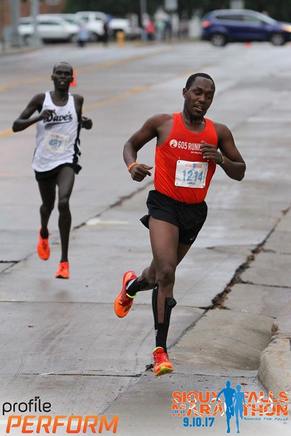 “I had a lot of time and didn’t know what to do with it,” Langat says. His former coach told him about a store in downtown Sioux Falls, 605 Running Co., and he decided to swing by one day. “I was like, oh, this is cool,” Langat says. He met Greg Koch, one of the owners, and was encouraged to join the group runs, which he did. “I was so out of shape, and it was really hard.” He entered a few races, including the Sioux Falls Half-Marathon, and took second place overall on virtually no training. Then it happened again and he realized, wait, I can still do this. “I started racing and I haven’t looked back,” Langat says. He should – there’s an entire field behind him. Since then he’s run a dozen half-marathons with a personal best of 1:08:23 and a hope of getting closer to the elite time of 1:05. He’s run two marathons, neither of which turned out like he hoped. “The marathon still owes me a lot,” Langat says. As his half-marathon times improved through his own commitment and coaching by 605 Running Co. owner Grant Watley, it opened doors, including one to Skechers, where Langat started as an ambassador and now is a sponsored athlete. “It’s a great opportunity for me,” Langat says, noting that he takes the hard work it requires seriously. Then he sits back for a moment, takes in the magnitude of what it all means. “That was my dream before – to be sponsored,” Langat says. “I used to see people and think, man, I wish that were me. Now, I’m going to be representing this big company. I think about growing up and taking care of my grandpa’s sheep and goats, and now I’m here, trying to represent Skechers. It’s a huge shift.” 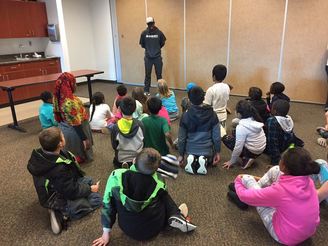 After the incredulity comes the gratitude. It’s one of his defining characteristics, this near constant pause to give thanks – to his faith, to his friends, to his coaches, to the people on the side of the race course, to anything outside of him that helped him get where he is and be who he is. And then there’s just Benson, and long solo miles, and all the time to think about what he’s accomplishing. “Most of the time, it’s just me,” Langat says. “You think about family. Sometimes I wonder what the roads are thinking about me this pavement. I’m always thinking about how amazing God is, and that’s the time I talk to God, about the opportunity and how life has turned out. From the rural parts of Kenya, from running barefoot to running here.” That doesn’t mean it’s always easy – he calls his training runs some of the best days of his life and some of the worst, just like the rest of us. “I remind myself, it’s just running. Just don’t stop.” The mantra he repeats is ‘patience,’ and it’s what he recommends to people who come into the store and are just starting out. A coach told him you can’t wake up and be fast, it takes time and talent and commitment, and he started out just like anyone – running from one telephone pole to the next. It’s an experience he says helps him relate to others. “When I am fitting someone with a pair of shoes and they say, ‘I am thinking of starting running,’ I say, ‘I know how that would feel,’” Langat says. He wants to inspire and help others like he was. He knows what that difference can do. “I own a pair of shoes,” he says with a laugh. “I only used to wear shoes to go to church. I am thanking God for a lot of things.”  Jacqueline Palfy is a longtime runner, reader and writer, marathoner, mom and board member of the nonprofit Sioux Falls Area Running Club. Her contributions to the 605 Running Co. blog will appear every other Tuesday. You can follow her on Twitter @runnerJPK or reach her at [email protected]. Story ideas are encouraged.
0 Comments
Leave a Reply. |
|

 RSS Feed
RSS Feed